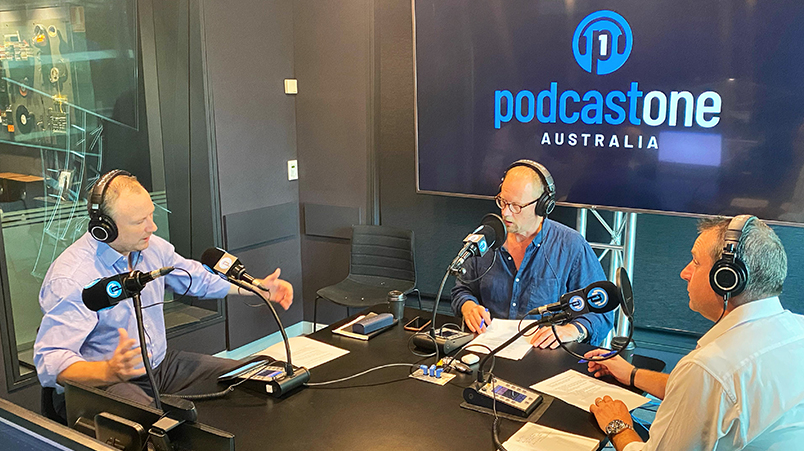‘Quad squad’: UM’s ex global media boss on leaving holdcos, the ‘appalling quality’ of user data and ‘a cascade of short-term bad decisions’ – expat Joshua Lowcock bids to disrupt ‘junk’ data, arbitrage models

Joshua Lowcock: "Everywhere I've ever worked – not just my immediate past, everywhere – making short-term quarterly decisions has led to a cascading amount of short-term bad decisions." Now he's going long-term all the way.
UM's former global media boss Joshua Lowcock drew a line in the sand last year. The Australian expat has since testified in the Justice Department's antitrust case against Google's search operation, which Google subsequently lost, while swapping the holdco game for US challenger Quad – a printing giant that has diversified into marketing services. Lowcock, a long-time critic of the "junk" data underpinning the $700bn digital ad industry, the ethics of surveillance media and the conflicts of interest arising from principal media models, thinks household address and consumption data from Quad's print business sets it apart. Now he's going after major accounts with it – and because Quad prints catalogues and in-store material for some of the biggest retailers, he says a lot of CMO doors are already open.
What you need to know:
- UM’s former global chief media officer and Australian expat Joshua Lowcock aims to go head to head with global holdcos in wooing major accounts at US marketing experience group Quad.
- But he won’t be using “junk” data or resorting to principal media models, AKA arbitrage. Lowcock thinks both models are deeply flawed.
- Instead he’s building a vast data resource from Quad’s sprawling print business – it prints magazines for major publishers and catalogues and in-store materials for big retailers and brands.
- That means it has a permanent data source that cannot be deprecated, a view on household consumption and interests and bedded-in relationships with key retailers and their CMOs.
- Lowcock claims Quad has another advantage: That data source means it doesn’t have to pay “hundreds of thousands of dollars” in onboarding fees to various third parties for every client campaign activated.
- Now he’s working to ensure marketers and procurement teams know what they are signing up for with principal models – and why they may not be getting what they are paying for.
The quality of digital data in the ecosystem is compromised. It's too easy to collect and buy. Data brokers or aggregators collect everything ... everyone's buying it and selling it to each other ... so you end up with just a lot of junk in the ecosystem.
In October 2020 New York based Australian expat Joshua Lowcock warned we would soon all be working for the tech platforms unless governments around the world quickly took action against data monopolies.
Back then Lowcock was Chief Digital and Innovation Officer at UM in the US and, as UM’s Global Brand Safety Officer, spearheading a Media Responsibility Audit program that held platforms to account while attempting to convince advertisers to bracket ad spend within the same governance framework as corporate social responsibility, or CSR.
The thinking was that advertisers could curb bad platform behaviours by spending more with those that at least attempted to clean up their act.
Fast forward and lawmakers are busy, with Google mired in antitrust legal battles, TikTok quasi-banned and bracing to offload and the rest of big tech either embracing misinformation, politically tweaking algorithms or donating cash – or all three – in a bid to shield against regulatory pressure.
Whether brands react to brand safety repercussions remains to be seen. History suggests cheap reach softens the ethics gradient.
Lowcock’s doubling down.
Out of the holdco game – and via testimony in the DoJ Google search antitrust case – he’s heading up media, data and analytics for $3bn US ‘marketing experience’ group, Quad, an end-to-end marketing services operation that expanded out of its sprawling US contract publishing print business – North America’s biggest.
From that legacy comes a vast US footprint of homes and household composition that give Quad a huge and permanent real life data resource: “The place that you call home defines who you are, as long as you start there and build out from that, you've always got a single source of truth,” Lowcock posits in the case for a Patagonia-like data company. He argues retail media has similarly robust credentials.
Lowcock thinks Quad’s physical address database, and visibility over what people receive in the mail from their various subscriptions and catalogs and therefore their interests sets it apart from the data broker-driven media industry and its deepening structural problems.
Long game
A year into the job, Lowcock’s convinced it was the right decision – he no longer has to walk and talk two different lines, something he alluded to via the medium of song when quitting.
“Everywhere I've ever worked in the in the past – not just my immediate past, everywhere – making short-term quarterly decisions has led to a cascading amount of short-term bad decisions,” he told Mi3.
“You have the market pressure, but you can't manage the market. You've got to manage the long-term creation of value and shareholder wealth – that is your obligation. But if you manage to the quarter you're managing the quarterly stock market bubbles and you'll go crazy. So the big appeal for Quad is we've fundamentally rewritten the way that we think about data from pricing the activation side.
“I've learned from the mistakes of the past and the mistakes that I've seen. We're not going to do that – and it'll be the breath of fresh air and oxygen [the ad industry needs].”
“Household address is resilient. You can't be deprecated.”
He said Quad will “not license that data source into the ecosystem” and it can “activate anywhere – without all the taxes and questionable things that happen in the industry”.
Activating on the third party data that largely fuels the digital ad machine, “that’s not where the market is going,” per Lowcock.
In general, he says, “the quality of [third party] data is appalling”, a point his former UM colleague, Arielle Garcia, has also made robustly.
“The quality of digital data in the ecosystem is compromised,” per Lowcock. “It's too easy to collect and buy. Data brokers or aggregators collect everything, and so you end up with just a lot of junk in the ecosystem. Everyone's buying and reselling it to each other, and there's no reliable way to basically ascertain the accuracy of that data.”
Hence the dollar trajectory of retail media – where Quad is increasingly active given the overlap with its in-store print and packaging business, and the fact that over a thousand of its employees are embedded within client operations.
“The reason you’re seeing the rise of retail media networks is because purchasing is a fundamentally true data point: I go in-store and buy a product; I'm a legitimate human being, [likewise] if I shop online and buy a product. It gets back to what do retailers have? Physical person, home address, proof of purchase. It's not noise and rubbish in the ecosystem.”
Plus, the connections from Quad’s print and packaging business open doors.
“This is where Quad is just great. For several major US retailers, we print all their in-store signage and display fixtures. When you think about our print relationships, it is significant, because for some of the major retailers here, we print all of their all their packaging for their in-store brands. So can I get a meeting with a CMO of a large national brand? Absolutely.”
Once you start making choices that serve your own interests over your clients’ media performance and results, it can be difficult to un-cross that line.
Principles over principals
“Our model is fee for service. So we're not relying on questionable, non-transparent bills,” says Lowcock (an approach mirrored in the US by fellow ex-holdco exec and one-time Australian operator, Dave Gaines, at Media by Mother).
That bucks the prevailing trend for the principal-based models – i.e. arbitrage – now favoured by both holdcos and an increasing number of independent agencies.
Lowcock is not a fan, suggesting perverse incentives are distorting outcomes for marketers and will ultimately be the undoing of agency groups as trusted advisors – likewise the increasingly intertwined reseller relationships between big tech and holdcos.
“We’re facing a critical moment to reaffirm the role of agencies as true partners for their clients — not merely as brokers focused on their own bottom line,” as he puts it. “Once you start making choices that serve your own interests over your clients’ media performance and results, it can be difficult to un-cross that line.”
Others – such as one-time holdco exec Brian Wieser, now CEO of advisory Madison and Wall – suggest marketers knowingly committing to arbitrage models may be the smart ones. They get services that procurement would otherwise scupper because they are not ‘working’ media – and because they are boosting agency bottom lines, will likely get better service overall.
Lowcock disagrees.
“Procurement departments care when they get educated. They just need to be educated.”
He thinks Quad can provide that education while delivering a clean financial incentive – and claims a competitive advantage of its data approach is that activation does not cost clients six figures every time they launch a campaign.
“Our data can be truly activated anywhere. We can effectively de-duplicate activation across all media channels, so you're not relying on using on platform data from one company and then a different audience here and a different audience here. It's being built so I can seamlessly activate anywhere without unnecessary taxes and fees,” per Lowcock.
“A big problem that comes from the legacy models is every time they activate, there’s massive cost on activation, whereas we’ve build a model where there's not massive cost.
“Mostly companies have to pay an onboarding fee to a third party – hundreds of thousands of dollars to activate. We’ve built our model not to necessitate that.”
Given Quad has operations in North and South America, Europe and Southeast Asia, will that model expand further under the expat’s watch?
“My goal is to win any big national US fight against any other company – and that includes the holding companies. I'm not going to go after global business,” per Lowcock. “Whether we expand globally is a long-term question.”
But the long-term thinking of Joel Quadracchi, Quad’s CEO and president, was what convinced Lowcock to sign-up in the first place.
“The thing that he said to me that got me across the line, was ‘Well, you make decisions for the long-term … People like to say that nice guys finish last. I like to think we finish first – we just need to be patient, because it takes longer’.
“So this is the place for me.”








